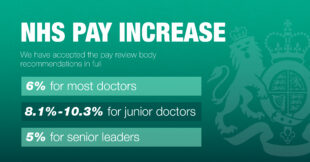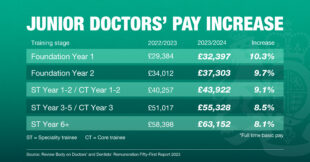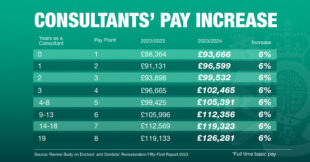
*Updated on 26 October*
The government has accepted the recommendations of the Independent Review Body on Doctors' and Dentists' Remuneration’s (DDRB).
The decision means that doctors in training (junior doctors) have received a permanent pay increase of on average 8.8% - between 8.1% and 10.3% depending on where they are in their training
Pay scales for consultants have also increased by 6%, meaning starting basic full-time pay will increase from more than £88,300 to £93,600. Full-time equivalent basic pay for consultants will increase by around £6,300 on average.
Below is a fact sheet setting out further detail and the press release can be found here.
How much will junior doctors receive?
- The national salary pay scales for junior doctors have increased by 6% plus a permanent £1,250 increase.
- Pay for junior doctors has been increased by an average of around 8.8%. Pay will be uplifted by between 8.1% and 10.3% depending on where they are in their training
- Average basic pay for a first year junior doctor has increased from £29,300 to £32,300 and for a junior doctor in core training with 3 years’ experience it will increase from £40,200 to £43,900.
- Some staff will also benefit from performance pay, overtime, pay progression and pay rises from promotion, alongside the pay uplift.
Is the £1,250 cash increase a bonus or a one-off?
- No. It’s a permanent increase for junior doctors, on top of the 6% increase.
How much will consultants and salaried GPs receive?
- Pay scales for consultants have also increased by 6%, meaning starting basic full-time pay will increase from more than £88,300 to £93,600.
- When that is taken with on-call payments and other activities, the average consultant’s NHS earnings are expected to increase to £134,000 a year.
- For consultants and SAS doctors on pre-2021 contracts, this is on top of the 4.5% pay rise they received last year.
- For Salaried GPs, the 6% increase raises the minimum salary by around £3,900 and the maximum by around £5,900. The GP contract has been uplifted to provide a 6% uplift for all salaried general practice staff (including salaried GPs, nurses and admin).
- Some staff will also benefit from performance pay, overtime, pay progression and pay rises from promotion, alongside the pay uplift.
Is the pay increase covering all salaried staff in general practice?
- Yes. Working closely with the British Medical Association, we accepted the Review Body on Doctors' and Dentists' Remuneration’s recommendation in full to give salaried general practice staff a 6% pay rise backdated to April. The GP contract has now been uplifted and we expect practices to pass this uplift onto all salaried practice staff, including nurses.
- The total value of the award for salaried practice staff in 2023/24 is 6%. GP contractors are excluded as they are subject to a five-year investment agreement to 2023/24, which was agreed with the BMA in 2019.
How much will dentists receive?
- The pay element of the contract for high-street dentists will increase by 6%.
- The salary for dentists undertaking Dental Foundation Training will rise from £36,288 to £38,465.
- Pay scales for salaried primary care dental staff will increase by 6%, which will raise the minimum salary at the lowest band by £2,697 (from £44,955 to £47,652) and the maximum salary at the highest band by £5,769 (to £101,923).
How much will senior managers receive?
- Pay for Very Senior Managers (VSMs) and Executive Senior Managers (ESMs) in the NHS will increase by 5%
- An additional 0.5% of the VSM and ESM paybill in each employing organisation will be used to address pay anomalies.
How is this being funded?
- The government will fund this pay award through prioritisation within existing departmental budgets, with front line services being protected.
- More borrowing would add pressures on inflation at exactly the wrong time, risking higher interest rates and higher mortgage rates.
- The government plans to increase the main rate of the Immigration Health Surcharge – to ensure it covers the full healthcare costs of those who pay it, having been unchanged for the last three years despite high inflation and wider pressures – to at least £1,035, and the discounted rate for students, their dependents, those on Youth Mobility Schemes and under-18s to £776.
- In written and oral evidence to the Pay Review Bodies, the government set out what was affordable within the NHS’s Spending Review settlement. The Pay Review Bodies have recommended pay awards above this level.
- Accepting the full DDRB recommendations is the fair and reasonable way to determine pay for doctors and dentists across the country.
Which existing budgets will this this come from?
- Further detail will be set out in due course.
When will staff receive the uplift?
- Doctors covered by the review body, which includes doctors in training, consultants, specialty and associate specialist (SAS) doctors and dentists, received their pay rise in September backdated to April.
Will you continue to negotiate with the unions on pay?
- No – the Prime Minister has been clear there will be no more talks on pay for this year.
How much will Agenda for Change staff receive?
- Following an agreement between the government and Agenda for Change unions, more than 1 million workers have already received pay rises backdated to April, as well as two one-off payments worth at least £1,655 for full-time staff.
- Further information is available here: Over one million NHS staff to receive pay rises from today - GOV.UK (www.gov.uk)
Have Agenda for Change staff received a smaller pay rise by agreeing a deal?
- No. Agenda for Change staff received a 5% pay rise and two significant non-consolidated awards - worth between 3.5% and 8.2% of 22/23 basic pay in total – at least £1655 for full-time staff.
- That came on top of an award of at least £1,400 for full-time staff the year before.
- The deal also included non-pay elements to better support the NHS workforce, including improving opportunities for nursing career progression, reviewing safe staffing guidance and reducing agency spend.
How do pay review bodies work?
- The independent pay review body process is the established mechanism for determining pay uplifts in the public sector and has operated for over four decades
- The PRBs are independent advisory groups made up of industry experts. Members of the PRBs are appointed following an open recruitment process and are made up of experts with experience in the NHS, HR, economics and other areas.
- PRBs make recommendations based on all the evidence they receive from a range of stakeholders, including government, NHS system partners and trade unions. They consider factors including the cost of living and inflation, recruitment, retention and morale, and value for the taxpayer.


Recent Comments